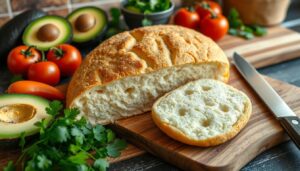Ever wondered why store-bought buns taste so different from homemade ones? Making sourdough hamburger buns from scratch can change your burger game. This guide will show you how to make artisanal sourdough buns that make your burgers better. Plus, they’re super easy to make!
In this article, you’ll learn the secrets to making the best sourdough hamburger buns. They’re soft, fluffy, and perfect for any cookout. You’ll get a simple recipe that will make your next barbecue unforgettable. So, let’s get baking and make some delicious sourdough buns.
Table of Contents
Key Takeaways
- Homemade sourdough buns are rich in flavor and perfect for any burger.
- The dough requires two rises, totaling around two hours before baking.
- Use a sourdough starter for unique taste and texture.
- Baking time is 20 to 25 minutes at 350 degrees Fahrenheit.
- Buns can be stored at room temperature and frozen for long-term use.
- Simple ingredients make baking accessible for everyone.
Introduction to Sourdough Hamburger Buns
Sourdough hamburger buns offer a unique twist on traditional buns. Their tangy flavor comes from a natural fermentation process. This makes them different from store-bought buns.
These buns are soft and chewy, adding a special touch to your burgers. Making them at home might seem hard, but it’s actually easy. You can make them in just one day with simple ingredients.
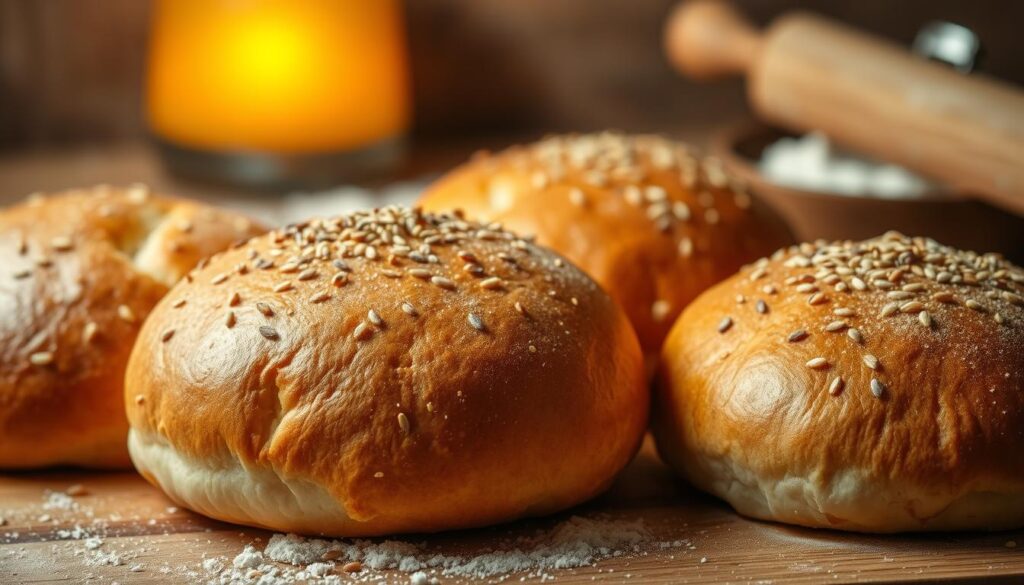
Starting your baking journey is exciting. Knowing about fermentation times and baking temperatures is key. A well-made dough with the right ingredients will give you great results.
| Characteristic | Measurement |
|---|---|
| Yield | 12 sourdough burger buns (110g each) |
| Total Dough Weight | 1,320 grams |
| Pre-Fermented Flour | 123.4% |
| Levain % in Final Dough | 492% |
| Total Hydration | 50.4% |
| Flour Specs | 100% organic strong bakers flour (12.4% protein, 0.54% ash) |
| Key Ingredients Ratio | 100% bread flour, 7.27% milk powder, 45.25% water, 0.5% salt, 14.99% sugar, 15.04% egg, 17.55% butter |
| Levain Weight | 124 grams |
| Bulk Fermentation Time | 2.5-3 hours |
| Baking Time | 20-25 minutes at 204°C/400°F |
With the right knowledge, you can make amazing sourdough hamburger buns. Enjoy the process and the satisfaction of baking at home!
Why Choose Homemade Sourdough Hamburger Buns?
Homemade sourdough buns are a top choice for those who value quality and freshness. You get to pick every ingredient, making buns that fit your taste. You can choose the flour and add sweeteners like honey for a unique flavor.
Homemade buns are also healthier. Using whole wheat flour boosts their nutritional value. Adding honey or maple syrup instead of sugar makes them even better for your family.
Baking sourdough buns is a calming activity. It connects you to the art of baking. Sharing your freshly baked buns at a barbecue is a great way to impress your guests.
Homemade sourdough buns offer a perfect mix of taste and texture. They’re ideal for holding your favorite fillings. Serving them is like sharing a piece of yourself, inviting everyone to enjoy together.
| Ingredient | Amount | Notes |
|---|---|---|
| Active Sourdough Starter | 50g | 100% hydration is recommended |
| All-Purpose Flour | 360g | Can replace up to 25% with whole wheat |
| Water | 240g | Add 25-30g more if using whole wheat |
| Honey | 30g | For sweetness and moisture |
| Salt | 10g | Important for flavor balance |
| Softened Unsalted Butter | 54g | For richness and texture |
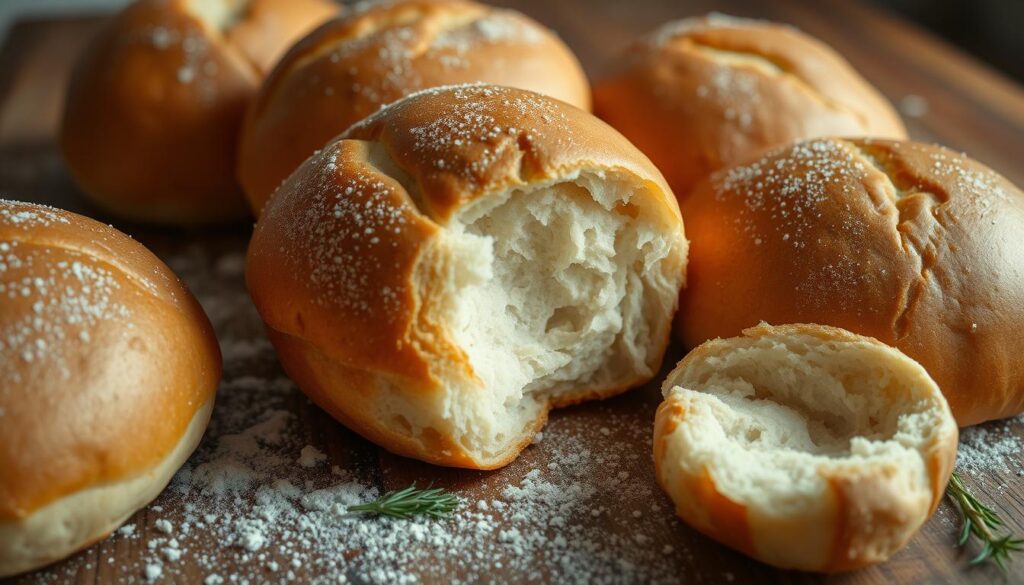
Ingredients Needed for Sourdough Hamburger Buns
To make delicious sourdough hamburger buns, you need some key ingredients. These ingredients are important for both taste and texture. Make sure you have the following:
- Active sourdough starter (3/4 cup or 60 grams)
- All-purpose flour (3 1/2 cups or 430 grams)
- Freshly milled whole wheat flour (3 cups, optional)
- Water
- Honey or sugar
- Salt
- Eggs (for the egg wash)
- Optional toppings such as sesame seeds
Each ingredient is crucial for your sourdough bun recipe. The sourdough starter makes the buns light. The flours add flavor and texture. Honey or sugar helps with browning and taste.
Salt is key for taste and helps the dough come together. As you follow the recipe, feel free to adjust based on your taste or what you have.
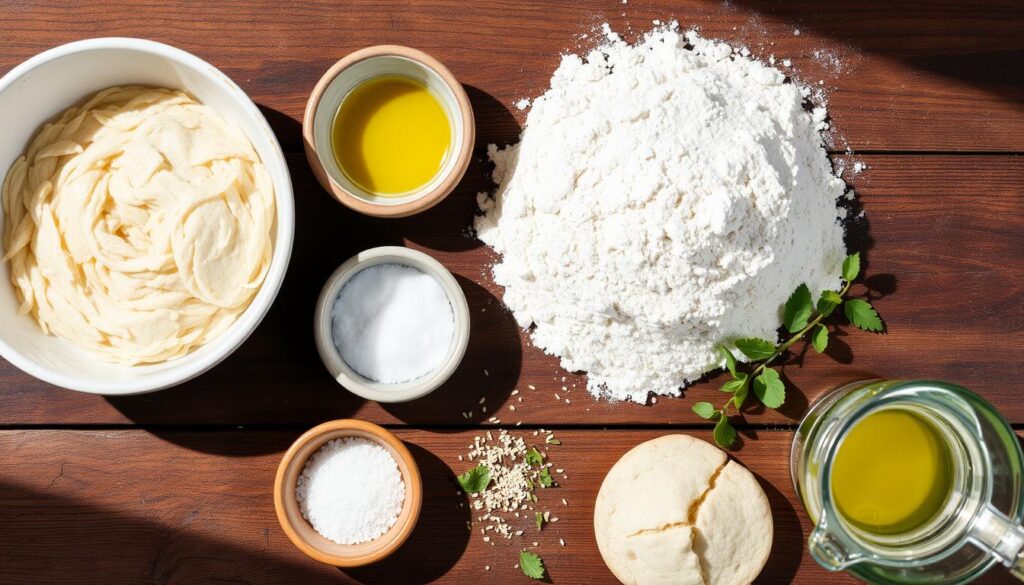
| Ingredient | Amount |
|---|---|
| Active Sourdough Starter | 3/4 cup (60 grams) |
| All-Purpose Flour | 3 1/2 cups (430 grams) |
| Whole Wheat Flour (optional) | 3 cups |
| Water | As needed |
| Honey or Sugar | As needed |
| Salt | To taste |
| Eggs (for egg wash) | As needed |
| Sesame Seeds (optional topping) | As desired |
Knowing these ingredients helps you make tasty buns. It also lets you customize the recipe for your own creations.
Preparing Your Sourdough Starter
To make the best sourdough buns, you need a good sourdough starter. Start by feeding your starter 12 hours before you plan to use it. Mix equal parts of flour and water with some of your starter. Stir well, then cover it and wait for it to double in size.
This shows your starter is active and ready to help your dough rise. An active starter makes your buns light and full of flavor. Watch for bubbles in your starter, which means it’s fermenting.
Here’s a simple table summarizing the steps for preparing your sourdough starter:
| Step | Action | Timeframe |
|---|---|---|
| 1 | Mix equal parts flour and water with your inactive sourdough starter | 12 hours before use |
| 2 | Cover and let it rise | Until doubled in size |
| 3 | Check for bubbles and activity | Every few hours |
By following these steps, you’ll have a strong sourdough starter for the best buns. Remember, using fresh, quality ingredients will make your buns even better. Happy baking!
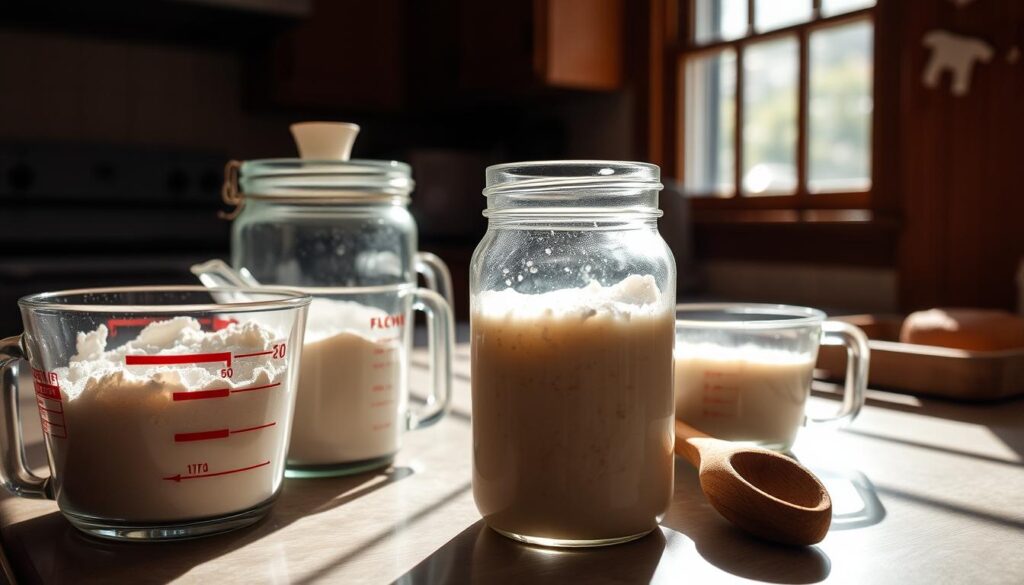
Step-by-Step Guide: Mixing the Dough
Making tasty sourdough hamburger buns starts with mixing the dough. It’s important to have the right tools and follow the right steps. This guide will help you mix the dough well.
Gathering the Right Tools
Before mixing, get these tools ready:
- Large mixing bowl
- Bench scraper for dividing the dough
- Spatula or your hands for mixing
Mixing in the Correct Order
Begin by mixing 54 grams of active sourdough starter with water, 533 grams of flour, sugar, salt, milk, and eggs. Stir until it’s a shaggy dough.
Let it rest for 30 minutes. This step is key for hydration and gluten development. After resting, knead the dough until it’s smooth and shiny.
| Ingredient | Amount (grams) | Baker’s Percentage |
|---|---|---|
| Bread Flour | 533 | 100% |
| Sourdough Starter | 54 | 10.1% |
| Water | 54 | 10.1% |
| Granulated Sugar | 27 | 5.1% |
| Salt | 10 | 1.9% |
| Whole Milk | 133 | 24.9% |
| Eggs | 150 | 30.9% |
| Unsalted Butter | 113 | 21.2% |
By following these steps and measuring ingredients correctly, you’ll improve your sourdough bun baking. Enjoy making and baking your delicious buns!
Understanding the Dough Consistency
Getting the right dough consistency is key for making tasty sourdough burger buns. Your dough should feel slightly tacky but not too sticky. This helps it keep its shape without falling apart, which is important for its texture and quality.
Begin by adding flour slowly and feel the dough. You want it to be soft and pliable. With practice, you’ll know when it’s just right for making great sourdough buns. Mixing the dough for 3-5 minutes by hand usually gets it to the right texture.
The fermentation process also plays a big role. It lets the flavors grow and makes the dough more elastic. You’ll see the dough rise with bubbles, showing it’s fermenting well. This step takes about 5 hours.
If you’re new to sourdough baking, don’t be afraid to try different things. Here’s a table to help you understand dough consistency and how to tell if it’s fermenting well:
| Dough Characteristic | Ideal Consistency | Signs of Good Fermentation |
|---|---|---|
| Tackiness | Slightly tacky, not sticky | Visible bubbles, rises well |
| Elasticity | Supple, easy to shape | Holds shape, no cracking |
| Moisture Level | Moderately wet | Maintains moisture, soft dough |
The Importance of Stretch and Folds
The stretch and fold technique is key in sourdough bun baking. It helps develop gluten strength and improves bun texture. After mixing, do three stretch and folds every 30 minutes. This makes your dough more elastic and helps it rise better.
Using this method, you’ll get buns that are light and airy. They’ll also keep their shape well after baking. For best results, follow a structured timeline. Rest your dough for 15 minutes before starting the stretch and fold. Repeat every half hour to boost gluten development.
The stretch and fold method greatly improves your buns. It strengthens the dough and supports other baking steps. For tips on making tasty buns, check out this recipe. It highlights the value of quality ingredients and techniques.
First Rise: What to Expect
The first rise is a key step in making sourdough buns. It’s also known as bulk fermentation. This phase lets the dough ferment, which is crucial for flavor and texture.
After stretching and folding the dough, cover it with a cloth. Let it rest at room temperature.
- The goal during this first rise is to let the dough double in size.
- Time required for the first rise can vary based on your kitchen’s ambient temperature, typically demanding about 6 to 8 hours.
Watch the dough become puffy with bubbles. This shows your sourdough is fermenting well. It’s a time when flavors develop, thanks to bacteria and yeast.
Remember, patience is important. A full fermentation makes your sourdough buns even better.
Shaping Your Sourdough Burger Buns
Shaping is key in making artisan sourdough burger buns. After the first rise, turn the dough onto a floured surface. Divide it into equal parts, about 112-115 grams each. This step improves both looks and texture.
Techniques for Shaping
Begin by pulling each dough piece into a tight ball. This helps with a good rise in the second proofing. Place the dough balls seam-side down on a parchment-lined baking sheet. Use a bench knife to avoid sticking, especially with soft dough.
These steps will give you beautifully shaped buns for the oven. Cover them with a snap-on half-sheet cover while proofing. This care in shaping greatly affects your buns’ final look.
| Pan Type | Capacity | Weight of Each Roll |
|---|---|---|
| LloydPans 10×2.25-inch Round Pan | 14 Rolls | 85g |
| USA Pan 8-inch Square Pan | 16 Rolls | 65g |
| Nordic Ware Aluminum Half Sheet | 5 Hamburger Buns | 120g |
Refrigerate the dough for about 15 minutes before shaping. This makes sticky dough easier to handle. It also helps get a tight, uniform exterior skin, crucial for the buns’ look.
Second Rise: Getting That Perfect Fluffiness
The second rise, also called the final proof, is crucial for homemade sourdough buns. After shaping, cover the buns to create a warm rising environment. This step takes 1-2 hours, during which the dough will expand and puff up.
A good second rise gives your buns a soft, airy texture. Skipping this step can lead to denser buns. Keep an eye on the dough. It should nearly double in size. A gentle press will show if it’s ready for the oven.
| Step | Time Duration |
|---|---|
| First Rise | 3-4 hours |
| Shaping Buns | 20 minutes |
| Second Rise | 1-2 hours |
| Baking | 23-25 minutes |
Letting the dough rise fully during the second rise will give you fluffy, delicious buns. Enjoy the journey and the outcome. Your patience will pay off with perfect results.
Baking Your Sourdough Hamburger Buns
When it’s time to bake sourdough buns, the excitement is high. You can’t wait for the delicious smell and the golden color. Start by heating your oven to 375°F (190°C). Brush the tops with an egg wash for a golden crust and to stick on toppings like sesame seeds.
Put the shaped buns in the oven and bake for about 25 minutes. Watch them closely. When they’re golden brown, they’re done. The kitchen will fill with a tasty aroma, telling you they’re ready.
Here’s a quick guide to what you need and when to do each step:
| Ingredient | Measurement |
|---|---|
| Warm Milk | 1 cup (240g) |
| Unsalted Butter | 4 Tablespoons (57g) |
| Active Sourdough Starter | 1 cup (200g) |
| Sugar | 2 Tablespoons (24g) |
| Egg + Egg Yolk | 1 each |
| Bread Flour | 3 ½ cups + 1 Tablespoon (500g) |
| Salt | 1 ½ teaspoons (11g) |
Baking sourdough buns is a rewarding process. Stick to the timeline for the best results, whether you bake them the same day or prepare them over two days. Your hard work will pay off with fluffy buns that make any meal better.
Storing and Freezing Your Fresh Buns
After baking your sourdough hamburger buns, it’s important to store them right. Let them cool on a wire rack first. For up to two days, keep them in an airtight container at room temperature. Freezing is a great way to keep them longer.
To freeze, put cooled buns in a freezer-safe bag. This way, you can enjoy them for up to a month. To thaw, just leave them at room temperature or reheat in the oven for a few minutes.
Here’s a quick guide for storing your buns:
| Storage Method | Timeframe |
|---|---|
| Room Temperature (Airtight Container) | Up to 2 Days |
| Refrigeration | Up to 1 Week |
| Freezing (Freezer-Safe Bag) | Up to 1 Month |
Batch baking and storing is popular among bakers. It lets you enjoy homemade buns whenever you want. For more recipe ideas, check out this guide on gluten-free bagels. It offers tasty options for different diets.
Conclusion
Making homemade sourdough hamburger buns adds a special touch to your meals. It makes them taste better and feel more satisfying. This guide has given you the skills to make delicious buns for any occasion.
The steps might seem hard at first, but the joy of making your own buns is worth it. You can now create fluffy buns that go well with any filling. Remember, baking is all about patience and practice.
For more baking ideas, check out this guide on sourdough pancakes. It can help you try new things in the kitchen.
Your homemade buns will make any meal special and unforgettable. Don’t be afraid to try new flavors and toppings. Enjoy the baking process.
F.A.Q
What are sourdough hamburger buns?
Sourdough hamburger buns are a tasty and soft option for burgers. They’re made with sourdough starter. This gives them a tangy taste and a tender texture.
How do I make sourdough hamburger buns at home?
To make sourdough hamburger buns at home, you need a few ingredients. These include sourdough starter, flour, water, honey or sugar, salt, and eggs for the egg wash. Follow the steps in this guide to get soft and fluffy buns.
Can I customize my sourdough bun recipe?
Yes! Making homemade sourdough buns lets you control the ingredients. You can change the sweetness, use different flours, or add toppings like sesame seeds. This way, you can make your perfect bun.
How do I know my sourdough starter is ready for use?
Your sourdough starter is ready when it’s been fed and risen for about 12 hours. It should double in size and show active bubbles. This means the yeast is active and will help your buns rise and taste great.
What is the ideal dough consistency for sourdough buns?
The dough should be slightly tacky but not too sticky. Getting the right texture is key. You should be able to handle the dough without it falling apart. This might mean adjusting the flour during mixing.
Why is the stretch and fold technique important?
The stretch and fold technique strengthens the dough’s gluten structure. This promotes better rise and texture. It helps aerate the dough and develop elasticity, making the buns light and airy.
How long should the first and second rises take?
The first rise, or bulk fermentation, takes about 6 to 8 hours. The second rise should take 1 to 2 hours. Both steps are important for flavor and fluffiness.
What temperature should I bake my sourdough buns at?
Preheat your oven to 375°F (190°C) for baking. Bake the buns for about 25 minutes or until they’re golden brown. This lets the delicious aroma fill your kitchen.
How should I store my sourdough hamburger buns?
Store cooled buns at room temperature in an airtight container for up to two days. For longer storage, freeze them in a freezer-safe bag for up to one month. Simply thaw or reheat as needed for the best taste.


